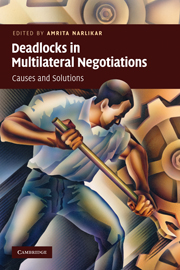Book contents
- Frontmatter
- Contents
- List of figures
- List of tables
- Notes on contributors
- Acknowledgements
- Introduction
- Part I Disciplinary insights
- Part II Case studies
- 5 Transatlantic intransigence in the Doha Round: domestic politics and the difficulty of compromise
- 6 Know the enemy: uncertainty and deadlock in the WTO
- 7 Entering the zone of agreement: the United States in climate change negotiations
- 8 The role of informal negotiation processes in breaking deadlocks: the UN Security Council
- 9 Negotiating international policies on Kosovo
- 10 Beyond negotiation deadlocks: the importance of mediation and leadership change
- Conclusion: case studies as evidence: lessons learned
- Bibliography
- Index
5 - Transatlantic intransigence in the Doha Round: domestic politics and the difficulty of compromise
Published online by Cambridge University Press: 05 June 2012
- Frontmatter
- Contents
- List of figures
- List of tables
- Notes on contributors
- Acknowledgements
- Introduction
- Part I Disciplinary insights
- Part II Case studies
- 5 Transatlantic intransigence in the Doha Round: domestic politics and the difficulty of compromise
- 6 Know the enemy: uncertainty and deadlock in the WTO
- 7 Entering the zone of agreement: the United States in climate change negotiations
- 8 The role of informal negotiation processes in breaking deadlocks: the UN Security Council
- 9 Negotiating international policies on Kosovo
- 10 Beyond negotiation deadlocks: the importance of mediation and leadership change
- Conclusion: case studies as evidence: lessons learned
- Bibliography
- Index
Summary
The Doha Development Round of multilateral trade talks have struggled since they began in November 2001 following a false start in December 1999. Ministerial meetings in Cancun in 2003 and Hong Kong in 2005 did not witness substantial progress. Subsequent smaller and more informal meetings intended to galvanise the negotiations in the summers of 2007 and 2008 also foundered on significant differences among the parties. As of the end of 2009 the negotiations had not been abandoned, but prospects of a rapid resolution appeared remote given the internal preoccupations of a number of the key players. Thus the Doha Round at the time of writing (January 2010) is an example of deadlock, in the form of an ‘extended delay’.
Rather than consider all of the reasons for deadlock in the negotiations, this chapter examines the challenges the negotiations pose for the European Union and the United States and how they have responded to them. The chapter focuses on the EU and the United States because they are the world's largest economies and largest importers and exporters of goods and services. Moreover, the multilateral trading system began as a primarily transatlantic project, and the United States and EU have been the key protagonists in the previous rounds of multilateral trade talks. With the greater assertiveness of emerging country governments – most notably those of Brazil and India and more quietly China – however, the multilateral trading system has become less of a duopoly.
- Type
- Chapter
- Information
- Deadlocks in Multilateral NegotiationsCauses and Solutions, pp. 123 - 141Publisher: Cambridge University PressPrint publication year: 2010
- 6
- Cited by



